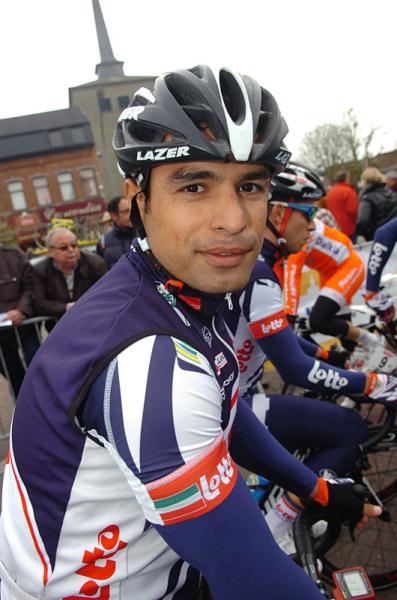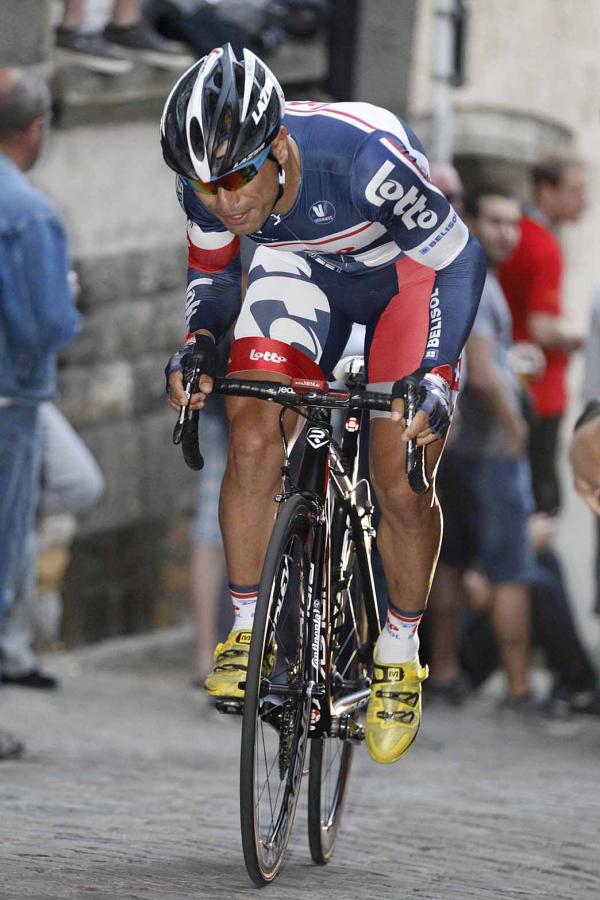Sohrabi left behind in Lotto Belisol's hunt for WorldTour status
Iranian surplus to requirements after one year at Belgian team


Lotto Belisol must wait a little longer to discover if it has retained its WorldTour status for 2013, but the Belgian squad has already shown its confidence in its existing line-up. Last week, the team announced that of the 28 men on the 2012 roster, 27 will return next season.
The odd man out is Mehdi Sohrabi, the Iranian rider who was in such demand this time twelve months ago. As winner of the 2011 Asia Tour, he carried enough UCI points to elicit a scramble for his services from a number of European teams vying for WorldTour berths. Mutual contacts with Ridley swayed the issue for Lotto Belisol and Sohrabi’s haul of points helped to earn them their place in cycling’s top division.
However, after a year spent adapting to the vagaries of life in Europe on and off the bike – not to mention a season spent riding in the service of others – Sohrabi finds himself without a WorldTour point to his name and is currently deciding on which Iran-based Continental outfit he will ride for in 2013.
“My contract was for one year, so I think next year I will be back with an Iranian team,” Sohrabi told Cyclingnews at the recent Tour of Beijing, his final race for Lotto Belisol. “I don’t know where exactly. There are four or five teams in Iran who need me, so I’ll see which team is going to go to the best races next season.”
As part of the all-conquering Tabriz Petrochemical team, Sohrabi had enjoyed a fearsome reputation on the Asia Tour in recent years, but on his arrival in Belgium at the beginning of 2012, the 31-year-old found himself back at the bottom of the ladder.
After debuting for Lotto at the Tour of Qatar, Sohrabi’s first European race was the Three Days of West Flanders in March. “That was a hard race for me because it had cobblestones, small roads, rain, cold, so everything in that race was new for me,” said Sohrabi, noting that the differences between racing in Asia and Europe are stark and extended beyond the weather and quality of the opposition.
“For the first three months, I had too many problems. In Asia, we race on big roads, but European the roads are usually quite narrow. In Europe, you’ve got 180-200 riders in every race, but in Asia, the maximum is 120 riders. The races are shorter in Asia too, whereas in Europe it’s almost a minimum of 200 kilometres. So everything was different.”
Get The Leadout Newsletter
The latest race content, interviews, features, reviews and expert buying guides, direct to your inbox!
In tandem with the steep learning curve on the road, Sohrabi was also trying to assimilate himself in Flanders, where Lotto had put him up in apartment in Vorselaar. “I’d never been in Belgium before, so the first four months were difficult for me as I was alone in Belgium,” he said. “It was hard for everything, training too, but afterwards, things were normal and it was ok.”
Iran
The exposed flatlands near Herentals are a far cry from the mountains of Sohrabri’s native Zanjan. The northwestern city is the heartbeat of Iran’s small but proud cycling tradition, and Sohrabi came to the sport as a 15-year-old schoolboy, rapidly catching the eye of the national team selectors.
“My city in Iran is the best city for cycling because it’s at high altitude, 1,800 metres above sea level,” Sohrabi said. “You have a lot of good roads and climbs, and good weather, so it’s perfect for training.
“Iranian riders are often the best riders in Asia and Iranian riders are usually climbers because we have a lot of mountains and we live at altitude. But cycling in Iran and in Asia is not like in Europe, it’s quite small. In Iran, there’s a maximum of 2,000 riders and it’s a big country. We have four or five Continental teams, but in a normal year, we have four 2.2 stage races, so there’s not too much racing.”
Sohrabi and his fellow countryman Amir Zargari, who rode for Ag2r-La Mondiale this past season, are the first Iranian riders to have competed at top-level European teams. Both men arrived in the autumn of their careers, but Sohrabi pointed out that for younger Iranians without UCI points, it is far more difficult to get the chance to compete in Europe.
“I hope it inspires some younger guys, but getting a European visa is a big problem for Iranian riders,” he said. “It wasn’t too hard for me to get a working visa, because the team helped me, but for other Iranian riders who want to come to European races, it’s a big problem.”
WorldTour
Of course, the irony is that while Sohrabi’s haul of UCI points secured him a contract for 2012, his lack of results in 2013 means that he is now surplus to requirements at Lotto Belisol. Paradoxically, the very system that presented him and Zargari with the chance to race in Europe also significantly reduces their chances of staying there longer than a season.
Sohrabi spent most of 2012 riding in support of his established leaders at Lotto Belisol, and even at that, his was a somewhat reduced race programme, with a ride at the Tour de Suisse the highlight.
“In every race, I’ve been working for the team, for some very good riders,” Sohrabi said. “In the last three or four months, everything was getting better and better for me because I was going to more races and getting used to it.
“Last year the points system was good for me but for some riders it’s not good. They spend all the year riding for other riders who take the points, while they have nothing after working all year. And it’s a problem to get a team the next year.”
Sohrabi shows no apparent rancour about how his time at Lotto Belisol played out, however, and gives the impression that he was simply glad to have had the chance to compete at WorldTour level in his career, albeit briefly.
“I’m 31 years old, so it was probably too late for me to come to Europe. It would be different if I was 21 years old,” he admitted. “Everything was new for me this year. I had too many problems earlier in the year, but it got slowly better as time went by.”
Zargari, too, is also set to return to an Iranian team in 2013. “Like me, he had too many problems earlier in the year and he came to Europe alone. He had the same problems as me,” explained Sohrabi.
And if Sohrabi returns to winning ways in the Asia Tour next year, would he answer the call from a WorldTour candidate should the opportunity arise in 2014? “Maybe,” he said. "Maybe."

Barry Ryan was Head of Features at Cyclingnews. He has covered professional cycling since 2010, reporting from the Tour de France, Giro d’Italia and events from Argentina to Japan. His writing has appeared in The Independent, Procycling and Cycling Plus. He is the author of The Ascent: Sean Kelly, Stephen Roche and the Rise of Irish Cycling’s Golden Generation, published by Gill Books.